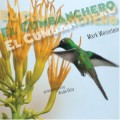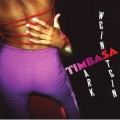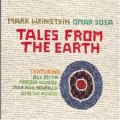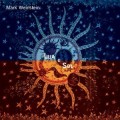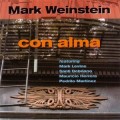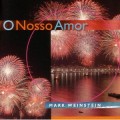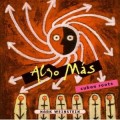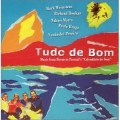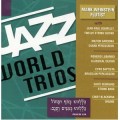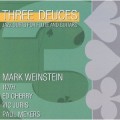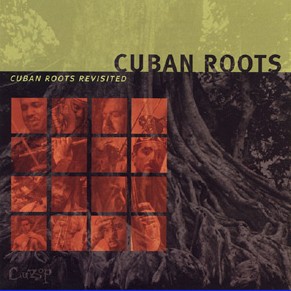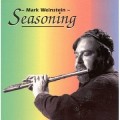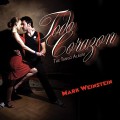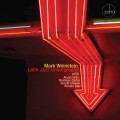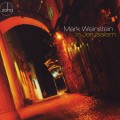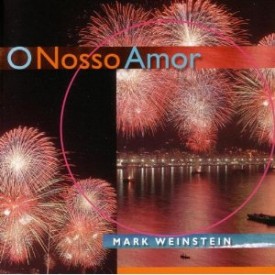
Reviews of O Nosso Amor
With O Nosso Amor, flautist Mark Weinstein has put together one of the year’s top Latin jazz releases. The recording, which is of superior quality and performance, resonates Weinstein’s texture on every track.
From the opening cut, “Bahia,” we are introduced to the pure skills of Weinstein as he weaves in and out of every solo line like the master he is. “Lugar Comum” highlights the extraordinary bass skills of Nilson Matta, who adds his gift to the composition and applies exactly what it needs. Weinstein has always surrounded himself with the best players and this recording is no different. Romero Lubambo on guitar is an absolute delight. His team play with Weinstein exemplifies the excitement and feel of Latin jazz.
“Frevo Camarada,” which was written by Lubambo, is a track that you will not get enough of. The title song, co-written by Anontio Carlos Jobim and Moraes De M.V.Cruz, is a beautiful composition that again highlights Lubambo’s phenomenal guitar work. The recording takes off with “Batucada,” a big-time samba party that will have you up and about the living room. The closing run of the recording includes some of the finest Latin compositions all around; however, the original work by Weinstein, “Marka Som,” demonstrates his superior composition ability.
This Jazzheads release is outstanding. From the compositions to the quality of recording, O Nosso Amor is on my top CD list for 2006.
by Steve Caputo
There’s nothing lovelier than an adept student of Bossa Nova who does justice to the idiom. Mark Weinstein’s choice of Romero Lubambo as the guitarist for his sextet was an intelligent choice to exploit and interpret the musical world of ‘Tom’ Jobim. This is Jobim and Bonfa of old, but with a modern contemporary twist. The group’s striking use of imagery in their renditions points to their unusual artistic sensibility and viewpoint about their chosen craft. They certainly have an innate knowledge of the latino culture and their renditions reflect this.
by George W. Carroll — The Musicians' Ombudsman, ejazznews.com
Flautist Mark Weinstein returns with another fine effort, hot on the heels of 2005’s critically acclaimed Algo Mas. The earlier album was a mix of Cuban roots and modern rock elements, but this new one finds Weinstein swimming in Brazilian waters, with the help of the great guitarist Romero Lubambo.
From the festive dance of the classic “Bahia,” to the serenity of Antonio Carlo Jobim’s “O Nosso Amor,” the set exudes a relaxed but spirited sound. Weinstein’s breathy flute work is like a gentle wind on “Naquele Tempo,” and beguils on “Marka Som.” As usual he surrounds himself with stellar musicians-percussionists, a tight rhythm section and, of course, Lubambo – who together fill the music with fantastic rhythms and bright solos.
by Mark F. Turner — AllAboutJazz.com
Mark Weinstein lanca “O Nosso Amor.” O CD traz 12 faixas, incluindo choro, samba, bossa nova, frevo, capoeira, jazz e batucada.
Lancado pela gravadora Jazzheads nos EUA, “O Nosso Amor” combina gloriosamente a musicalidade e a composicao talentosa desse brilhante inovador do jazz. “O Nosso Amor” exibe a magia de Mark Weinstein juntamente com musicos conceituados como Romero Lubambo na guitarra, Nilson Matta no baixo acustico, Paulo Braga nos tambores, e Guilherme Franco e Jorge Silva na percussao.
Prometendo ser um dos lancamentos tops de jazz latino neste ano, “O Nosso Amor” e um exemplo extraordinario da interpretacao de Weinstein sobre o estilo afro-latino e afro-cubano.
Mark Weinstein e um inovador em jazz latino por estar entre os primeiros musicos de jazz a gravar com secoes de ritmos cubanos tradicionais. O album “Cuban Roots” (Raizes cubanas), lancado em 1967, e uma obra classica com toques de Mark no trombone e Chick Corea no piano numa epica transformacao do jazz latino.
by Brazilianvoice.com
Mark Weinstein’s “O Nosso Amor” a Masterpiece!
Flute virtuoso, Maestro Mark Weinstein. A world-class musician. A phenomenon!
Nowadays, few flutists and musicians can match the amazing creative talent of Mark Weinstein. This man is a musical phenomenon. Mesmerizing, authoritative yet, charmingly and tenderly captivating. His recent CD “O Nosso Amor” as expected to be or to appear is no less than a monumental musical accomplishment. It is a masterpiece at so many levels. A pure musical magic. The album contains 12 tracks of an exquisite beauty, delivered with luxurious musical wealth, superb arrangements and utmost musical nostalgia. The highlights of the CD are: Bahia, O Nosso Amor and Sampa 67. The amazing aspect of this CD is not exclusively the authentic delivery of pure Jazzy-Brazilian repertoire, but the unmatched improvisation and musical virtuosity of Mark Weinstein on flute, Nilson Matta on bass, Romero Lubambo on guitar.
The beauty of the music on the CD metamorphosed through delightful strokes and vibes by Paulo Braga on drums, Guilherme Franco on percussion, and Jorge Silva, also on percussion. “Bahia” one of my favorite tunes of the CD is an all time international favorite of world music lovers. It has been recorded by leading performers like Placido Domingo, the legendary John Coltrane and Carmen Miranda. But Mark Weinstein’s recording is quite different. It is more vivacious with its haunting Jazz-swing tempo. It comes to life with burst of joy and enchanting romance. “O Nosso Amor” is a wonderful CD, warm, luxurious, lyrical, rich and infinitely haunting. Grab a copy. It is almost perfect. Rating: 5 stars out of five. A world-class musical quality.
by Maximillien de Lafayette — www.worldjewishnewsagency.org
Mark Weinstein has already proven himself to be a magnificent flutist in the world of Brazilian jazz with two CD’s, Jazz World Trios and Tudo de Bom. His latest, O Nosso Amor solidifies his standing, as if it needed any solidifying. Weinstein and his band interpret several Brazilian styles in a program of originals and Latin classics. Weinstein has a wonderful light and gentle musical sensibility that comes through clearly on each track. Whatever the situation and/or style call for Weinstein provides through an assortment of soprano, alto and bass flutes. His band is supportive and exciting. O Nosso Amor is a great CD sure to be loved by all fans of Brazilian jazz.
Continuing to show the love and affection he as for Antonio Carlos Jobim he showed on his previous releases, Weinstein includes three tunes by the classic Brazilian composer. The tile track, from the Black Orpheus soundtrack, is in a relaxed medium tempo, with a beautiful unison melody by Weinstein and guitarist Romero Lubambo. Por Cause de Voce is a samba (or more precisely – as the liner noted point out – a samba cancao), which Weinstein plays on alto flute. This intoxicating instrument works well on the gentle ballad. The final Jobim tune is “Falando de Amor,” another ballad-ish song identified as a “chora-cancao.” “Lugar Comun” a bossa-esque ballad was written by two other classic Brazilian composers, Joao Donato and Joao Gilberto.
The liner notes of O Nosso Amor serve as a mini-history of Brazilian improvised music. For instance, they point out that Afredo da Rocha Vianna Jr., ‘pixinguiha’…continues to he regarded as the greatest choro composer and flutist of all time. Two of the Latin masters choros are included. “Um a Zero,” an up-tempo flute feature, was composed in honor of Brazil’s winning its first international soccer title in 1919,” “Naquele Tempo is a slow and easy ballad which Weinstein performs wonderfully on bass flute. “Bahia,” the energetic opening samba, was written by Ary Barroso, another classic Brazilian composer.
The band members also contribute several original tunes. Weinstein himself wrote “Marka Som,” a slow to medium bossa nova. In a jazz samba style is “Sampa 67,” written by bassist Nilson Matta. The tune is energetic and has a syncopated melody. Percussionists Guilhermme Franco and Jorge Silva contribute an improvised percussion feature, “Batucada.” “Frevo Camarada” is an energetic up-tempo march written by guitarist Romero Lubambo. Finally from Guilherme Franco comes “Capoeira,” “inspired by the rhythm of the Bahian berimbau.
O Nosso Amoris a wonderful collection of Brazilian tunes, old and new. The band is traditional yet hip. They support Weinstein in his masterful flute playing with tasty accompaniments. They also have something to say individually: all as improvisers and several as composers. Weinstein has presented a program that is a balanced as it is diverse. He is clearly one of the greatest Brazilian flutists recording today.
by David Miele — Jazz Improv
I first heard Mark Weinstein play with Cal Tjader and Eddie Palmieri on the 1966 recording El Sonido Nuevo. That recording represented the hotter side of his music. This CD, O Nosso Amor, includes – almost exclusively – the sweeter side of his music. The twelve selections on this CD include three compositions by Antonio Carlos Jobim, three by highly respected writers of the past, one by Donato/Gilberto/Gil, and five by members of the ensemble. The recording quality is excellent, and I want to make special note that they achieved a “Goldilocks” use of percussion: not too little, not too much, just right.
Classical guitarist Lubambo is outstanding throughout the CD. He is a strong and capable musician who demonstrates the influence of Charlie Byrd and for a few moments, Baden Powell. The great Ary Baroso’s lovely “Bahia” is the lead off selection of the CD. It is the closing piece on the 1961 Getz-Byrd Jazz Samba. The two versions are very different, but Lubambo is the glue that provides some relationship between the two versions. This version is much looser than that earlier one. The earlier one had two bass players, which provided a gravity that this one does not have or need or want. It is free and happy. The guitarist’s ability in single string and chordal soloing is very audible on this track. Weinstein demonstrates beautiful use of the lower register of his instrument on the middle section of the song. The other composer of the past, Alfredo de Rocha Vianna Jr., “Pixinguinha” is represented by “Naquele Tempo”, and “Um a Zero”, two of the most compact pieces. The former is especially noteworthy for Weinstein’s use of the bass flute, which I haven’t heard used to any great extents since Paul Horn’s performances of the early 1960’s. The moderate tempo is for all intents and purposes a duet between flute and guitar. The later piece is up-tempo with great use of modulation.
The five selections composed by the members of the group have great variety. The brief “Batucada” is a samba percussion parade. Bassist-co-producer Matta’s contribution, “Sampa.67”, is an up-tempo piece with a great flute-guitar-bass-unison sections and ascending, although minimal, harmonies. The beautiful guitar interlude once again shows Lubambo’s excellent single string and chordal styles. Lubambo’s Frevo Camarada’ is up-tempo as well, demonstrating a Byrd-like include, with a few flashes of Baden Powell. There is a great percussion display with the section using different instruments. Leader Weinstein’s “Marka Som” is a positive and optimistic melody played by the flute, bass and guitar. There is a lovely descending chord figure played on the guitar immediately before the flute starts the final melody. Percussionist Franco’s “Capoeira” closes the CD and is unquestionably the freest in form. There is one chord used, and the soloists are almost ‘avant garde’ on the selection. The bowed bass solo is reminiscent of Paul Chambers’ great work.
“Lugar Comum” by Joao Donato, Joao Gilbeto and Gilberto Gil features the leader on alto flute. There is wonderful interplay between the bass and guitar. The guitar accompaniment is superb and more readily appreciated in this piece. Finally congratulations to Weinstein for choosing three of Antonio Carlos Jobim’s lesser-know pieces. “O Nosso Amor'”(by Jobim and Moraes) is one of the earlier of Jobim’s pieces to reach public acclaim as it was part of the score of Black Orpheus. The use of percussion and bass solo is especially noteworthy. “Falando de Amor is moderately slow in a minor key. Matta’s bass solo, which takes place early in the piece, is outstanding both technically and emotionally. “Por Causa de Voce” (by Jobim and Duran) is a lovely ballad. I hear no use of percussion on this piece.
The musical form explored on the CD has proved itself highly enduring after close to a half century. May in long endure, and may we hear much more from Weinstein and his associates.
by Marshall Zucker — Jazz Improv
Mark Weinstein’s love affair with Brazilian music is not new. Back in 1998, in his “Jazz World Trios” CD he had already included Brazilian music in his repertoire. He also had special guests such as Romero Lubambo and Cyro Baptista. Deepening that relationship, in 2003 he released the wonderful “Tudo de Bom,” featuring thirteen tracks all written by Hermeto Pascoal from his superb “Calendario do Som” project. In that album, the band working with Weinstein was comprised of Richard Boukas (guitar, vocals), Nilson Matta (bass), Paulo Braga (drums) and Vanderlei Pereira (percussion). There is not much to say about Tudo de Bom without using superlatives. The music is excellent, and all performers shine brilliantly.
Three years later, Weinstein comes back to more Brazilian music in his latest CD “O Nosso Amor.” This time, the repertoire is clearly diverse and covers original pieces Weinstein wrote as well as Brazilian gems by Tom Jobim, Ary Barroso, Joao Donato, Pixinguinha and others. The band accompanying Weinstein this time is Paulo Braga (drums), Guilherme Franco (percussion), Jorge Silva (percussion) and two thirds of Trio da Paz with Romero Lubambo (classical guitar) and Nilson Matta (bass) — that alone is the icing on the cake. Besides the music and performers, the arrangements featured in “O Nosso Amor” deserve special recognition. Weinstein knows just the right blend when he uses his bass, alto and soprano flutes. It’s like having three excellent musicians featured in one album. Ary Barroso’s classic opener “Bahia” starts off the selections in “O Nosso Amor.” With Lubambo’s classy guitar introduction enriched by shakers and whistles, Weinstein lets loose to a good start. This nice piece gets the band warmed up for what is coming up. When Matta opens Donato’s well known “Lugar Comum,” a soft swinging mood takes over the previous samba beat from the opener. Matta still comes back from for a rich bass solo in the middle of the track. This guy has the touch, no doubt, and to prove his bass can almost speak, Matta’s own “Sampa 67” spices things up. The same goes to Lubambo’s energized “Frevo Camarada,” which is everything its name says: a high-energy frevo.
Jobim is present in three instances: “Falando de Amor” is performed in choro style, with flute, pandeiro and guitar dominating the track, but yet allowing Matta’s bass solo a featured spot in the arrangement; the title track gets a more direct samba approach; and finally, “Por Causa de Voce” shows the romantic side of Jobim. Weinstein’s original pieces in the album prove just how much Brazilian blood are running in his veins. “Batucada” is a percussion festival inspiring listeners to get down and samba as if in Rio during Carnaval. “Marka Som” is more cadenced and peaceful. Two of the most beautiful moments in the album are from the Pixinguinha repertoire. While “Um a Zero” is jovial and playful, “Naquele Tempo” is pure ecstasy with the richest bass flute sound you’ll ever hear. In closing the album, Franco’s original “Capoeira” brings back all musicians to one last chance to showcase their talents in a delicious baiao. It’s a perfect closing.
by Egidio — MusicaBrasileira.org
